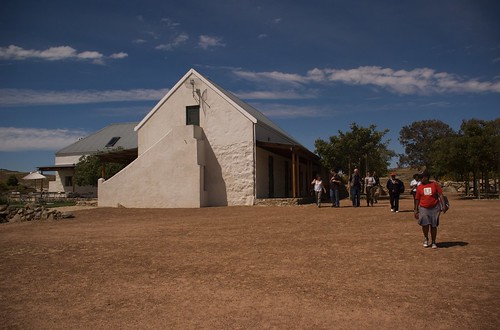The surprise highlight of this trip for me so far hasn’t been a helicopter flight, luxury resort, or journey down three and half kilometers to the world’s deepest mine. No, what has impressed me the most was a lunch-time visit to !Khwa ttu, a culture and education center for the San people of Southern Africa that sustains its operations through a tourism lodge and restaurant.
!Khwa ttu’s restaurant and gift shop.
Trip out on this: if you trace your ancestry from your parents to your parent’s parents and their parents and so on for thousands of generations (back 60,000 years ago), then you’ll find that you share a direct ancestor of this man:
That’s Andries, a 30-year-old from the ‡Khomani community of the Kalahari who learned how to become a tour guide at !Khwa ttu. Along with his colleague Kerson, Andries taught us how to pronounce the klicks and klacks of the various San languages.
Video by Simon Barber.
After our lesson in Khoi and San languages we were shown the following video about the making of the photographic exhibit “The San and the Camera.” The Khoi and San peoples have long been exoticized on the covers of travel pamphlets, in museum exhibits, and in movies like The Gods Must Be Crazy. But their current reality, marked frequently by discrimination and poverty, is ignored by most media.
You can see a more general video about the !Khwa ttu center on their website. What has me excited about the project is that it is able to preserve dying cultures and languages, generate jobs, teach new skills, and educate others all while staying sustainable from its tourism revenue.

If you ever visit Cape Town I highly recommend taking the hour drive to !Khwa ttu to check things out. Their meals are delicious, the photographic exhibit is impressive, and the staff are absolutely lovely. Plus, you’d be supporting a very good cause. Now we just need to get them blogging. ![]()

David Sasaki is the Director of Rising Voices, a global citizen media outreach initiative of Global Voices Online.
He manages a portfolio of small-scale projects around the developing world that use citizen media to effect social change.
Prior to his current focus on outreach, he served as Global Voices’
Latin America Regional Editor, monitoring the Latin American blogosphere, highlighting key content and translating select posts from Spanish to English.
Sasaki transitioned into online journalism after working as a freelance
web developer and English instructor in Monterrey, Mexico. He now splits his time and residence between North and Latin America and writes frequently at Rising Voices, Online. He manages a portfolio of small-scale projects around the developing world that use citizen media to effect social change.
Prior to his current focus on outreach, he served as Global Voices’
Latin America Regional Editor, monitoring the Latin American blogosphere, highlighting key content and translating select posts from Spanish to English.










